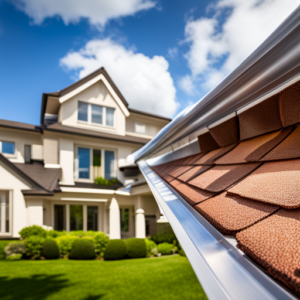Owning a house comes with many responsibilities, and one of the most important ones is ensuring that your home is safe and protected from potential damage. One crucial aspect of home protection is the installation and maintenance of gutters. Many homeowners often ask, “Are gutters necessary for all houses?” In this article, we will discuss the purpose of gutters, the consequences of not having gutters on your house, and the types of gutters available for different homes. We will also address situations when gutters may not be necessary, proper gutter installation and maintenance, the cost of installing and maintaining gutters, and alternatives to traditional gutter systems.
Are gutters necessary for all houses?
The short answer is yes – gutters are necessary for most houses. Gutters are an essential part of your home’s exterior, as they help protect your home from water damage. They collect and channel rainwater and melting snow away from the foundation of your home. This prevents water from seeping into your basement or crawl space, which can lead to mold, mildew, and structural damage.
However, there are some instances where gutters may not be necessary, which we will discuss later in this article. But for the majority of homes, gutters are an essential component of a well-protected home.
The purpose of gutters: protecting your home
Gutters serve several vital functions in protecting your home. First and foremost, they help to divert water away from your home’s foundation. By doing this, they prevent the soil around your home from becoming saturated, which can lead to foundation damage and even collapse in extreme cases. Gutters also help to prevent water from seeping into your home’s walls and causing mold and mildew growth, which can lead to respiratory issues and other health problems for you and your family.
In addition to preventing damage to your home’s foundation and walls, gutters also protect other parts of your home. They help to prevent water from pooling around your home, which can cause damage to your landscaping and create dangerous icy patches in the winter. Gutters also protect your roof and siding from water damage, prolonging their lifespan and saving you money on repairs.
Consequences of not having gutters on your house
If you’re still wondering, “Do houses need gutters?” consider the potential consequences of not having gutters on your home. Without gutters, rainwater and melting snow will flow directly off your roof and onto the ground surrounding your home. This can cause several problems, including:
- Erosion: As water flows off your roof and onto the ground, it can cause the soil around your home to erode. This can lead to foundation problems and even structural damage over time.
- Flooding: When water isn’t properly diverted away from your home, it can pool around your foundation and seep into your basement or crawl space, causing flooding and water damage.
- Mold and mildew: Excess moisture in your home can lead to the growth of mold and mildew, which can cause health problems and damage your home’s interior.
- Damage to siding and paint: Water flowing down the side of your home can cause damage to your siding and paint, leading to costly repairs.
- Ice dams: In the winter, the lack of gutters can contribute to the formation of ice dams on your roof, which can cause leaks and damage to your roof and attic.
Types of gutters for different homes
Now that we’ve established that gutters are necessary for most homes, let’s discuss the different types of gutters available. There are several types of gutters on the market, each with its own set of benefits and drawbacks. Some of the most common types of gutters include:
- K-style gutters: These gutters are the most popular type of gutters in the United States. They have a flat back and a decorative front that resembles crown molding, making them an attractive option for many homeowners.
- Half-round gutters: These gutters are shaped like a half-circle and are a popular choice for older, historic homes. They have a classic look and can be made from various materials, including copper, aluminum, and steel.
- Box gutters: Box gutters are typically found on commercial buildings and some older homes. They are built into the roof structure and can be made from various materialslike wood, metal, or PVC.
- Seamless gutters: These gutters are made from a single piece of material, which eliminates the need for seams that can potentially leak. They are custom-fit to your home and can be made from various materials, including aluminum, copper, and galvanized steel.
When choosing the type of gutters for your home, it’s important to consider factors such as the style of your home, your budget, and the climate in your area. A professional gutter installation company can help you choose the right gutters for your home and ensure proper installation.
When are gutters not necessary?
While gutters are necessary for most homes, there are some situations where gutters may not be necessary. For example, if your home is located in an area with very little rainfall, or if your home has a steeply-pitched roof that doesn’t allow water to collect, gutters may not be necessary.
Additionally, some homes are built with deep overhangs that effectively divert water away from the foundation, eliminating the need for gutters. However, it is important to consult with a professional to determine if gutters are truly unnecessary for your home.
Proper gutter installation and maintenance
Proper installation and maintenance of your gutters are crucial to their effectiveness in protecting your home. Gutters should be installed by a professional to ensure that they are properly aligned and sloped to allow for proper drainage. Improperly installed gutters can cause water to accumulate or flow in the wrong direction, leading to damage to your home.
In addition to proper installation, regular maintenance is necessary to ensure that your gutters are functioning correctly. Gutters should be cleaned at least twice a year to remove debris such as leaves and branches that can clog the system and prevent proper drainage. It’s also important to check for leaks and damage to the gutters and repair them promptly to prevent further damage to your home.
The cost of installing and maintaining gutters
The cost of installing and maintaining gutters can vary depending on several factors, including the type of gutters you choose, the size of your home, and the complexity of the installation. On average, homeowners can expect to spend between $600 and $2,000 to install gutters on their home.
The cost of maintaining gutters is typically lower, with most homeowners spending around $200 per year on cleaning and repairs. However, the cost can be higher if your gutters require more extensive repairs or if you need to replace your gutters entirely.
While the cost of installing and maintaining gutters may seem like an added expense, it is important to remember that gutters can save you money in the long run by protecting your home from costly water damage.
Alternatives to traditional gutter systems
While traditional gutter systems are effective in protecting your home, they may not be the best option for every homeowner. There are several alternatives to traditional gutter systems that you can consider, including:
- Rain chains: Rain chains are a decorative alternative to traditional downspouts. They are made of metal or other materials and hang from the roof to direct water away from your home.
- French drains: French drains are underground drainage systems that effectively divert water away from your home. They are typically installed around the perimeter of your home and can be an effective alternative to gutters in certain situations.
- Green roofs: Green roofs are roofs that are covered in vegetation. They can effectively absorb and filter rainwater, reducing the need for gutters. However, they can be expensive to install and maintain.
While these alternatives may not be suitable for every home, they are worth considering if you are looking for a more eco-friendly or aesthetically pleasing option.
Conclusion: The necessity of gutters for a well-protected home
In conclusion, gutters are a necessary component of a well-protected home. They prevent water damage to your home’s foundation, walls, and other parts of your home. Proper installation and maintenance of your gutters are crucial to their effectiveness in protecting your home.
While gutters may not be necessary for every home, it is important to consult with a professional to determine if they are necessary for your home. If you do decide to install gutters, it’s important to choose the right type of gutters for your home and to properly maintain them to ensure their effectiveness.
Don’t wait until it’s too late – invest in gutters for your home today to protect your home from costly water damage.


